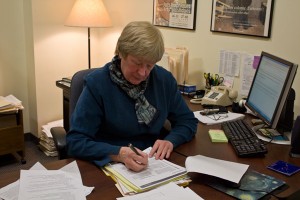Ithaca College and Cornell University have collaborated on a new plan that will grant Master of Arts in Teaching degrees from the college to Cornell graduates.

The Master of Arts in Teaching program at the college offers teacher training in English, French, German, Spanish, mathematics, biology, chemistry, physics and social studies.The prerequisites for the program include certain educational and psychology courses and at least 50 hours of course-connected field experience. Upon completion of the 13-month program, which begins after Memorial Day, graduates are fully eligible for initial teacher certification in New York state.
Travis Park, director of teacher education at Cornell, said the program presently in place at Cornell is one that prepares students to teach biology, chemistry, physics, earth science and agricultural science.
These are usually students who want to teach at the middle school or high school levels. The new agreement is of special interest to students in the education minor at Cornell who want to teach subjects other than one of the sciences.
“We really are evolving to an embedded model of teacher preparation where our faculty is interspersed within other science disciplinary fields and departments,” Park said.
Cornell’s Department of Education was broken up almost two years ago, but the education minor remained, and professors from the department were distributed into other departments.
The new arrangement is set up so students who complete the education minor program at Cornell simultaneously complete the prerequisites for the Master of Arts in Teaching program.
There is an existing arrangement between the college and Cornell where any student can complete a maximum of 12 credit hours free of charge at the other institution.
Linda Hanrahan, chair of graduate programs in education at the college, said the college is trying to make the transition smoother for the students. Before this agreement, Cornell graduate students had to go through all the application processes.
“Now if they’ve completed a full minor in education at Cornell, they don’t have to send us separate letters of recommendation,” she said. “The director of their program [at Cornell] is going to let us know whether the people who teach the courses in the education minor believe the applicant is going to become a good teacher.”
Marita Neidecker, a graduate student with an undergraduate degree in biological science seeking a degree and teacher certification at Cornell, said the new agreement increases the number of opportunities for students.
“It makes Cornell sound a lot more marketable and attractive to students to know that they have that option,” she said.
The articulation agreement just began and the application was due Feb. 15, so there is no definite number of participants. The program has rolling admissions, but gives preference to applicants whose files were complete last week. Applicants will be notified of acceptance within a couple of weeks.
Hanrahan said this new arrangement will not cost the college anything extra and there will be no need for new professors because there will not be large numbers of Cornell graduate students taking part in the Master of Arts in Teaching program for a while.
“We expect more applicants in the future because it will be more well known that we’re doing this,” she said.
In the years to come, there may be some courses done jointly between the two institutions using the best resources from both.
“I can envision some arrangement between our teacher education programs where there might be a class that there is not capacity to teach at either place regularly but is kind of a special topic that we might teach collaboratively,” Park said.
Hanrahan said there are no concrete benefits for the college from the agreement yet, but there are some implied for the future, especially for graduates from the college.
“The MAT program is based on a cohort,” she said. “The stronger that group of students is, the more they learn from and with each other.”







